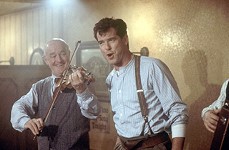Gentlemen Don't Eat Poets
1995, R, 97 min. Directed by John-Paul Davidson. Starring Alan Bates, Theresa Russell, Sting, Trudie Styler, Lena Headey, Jim Carter, Chris Barnes, Steven Mackintosh, Anna Massey.
REVIEWED By Marc Savlov, Fri., May 9, 1997
Scrupulously based on Patrick McGrath's novel The Grotesque, Gentlemen Don't Eat Poets is so thoroughly a British class farce that it may not translate well to stateside audiences. That's too bad, because its gloomy, neo-gothic take on manners, mores, and very naughty butlers is a wonderful diversion from this summer's tsunami of Hollywood shoot-'em-ups. The film is set in 1949 and Bates plays Sir Hugo Coal, the acerbic, paleontologically-obsessed lord of a decaying country manor whose greatest passions in life are his pet toad and sharing a pint down at the pub with his friend George (Barnes), the neighborhood hog-skinner. Sir Hugo's decrepit household -- populated by his American wife Harriet (Russell), his loving daughter Cleo (Headey), and his collection of Jurassic bones -- is turned upside down after the arrival of the family's new butler Fledge (Sting) and his wife Doris (Styler, Sting's real-life spouse). Fledge and Sir Hugo take an immediate dislike to each other and embark upon a bitter war of nerves, gradually raising the stakes from simple annoyances to outright murder. Into this already heady mix comes the news that Sir Hugo's darling Cleo plans to marry an ineffectual poet, Sidney Giblet (Mackintosh). Meanwhile, Harriet finds time to fall into a steamy affair with the wily butler, while Mrs. Fledge begins her own romance with the cooking sherry and drifts in and out of sobriety. Hardly your standard Hollywood fare; Merchant-Ivory would have passed on this as well, I think. Nevertheless, aside from its horribly unnecessary retitling, Gentlemen Don't Eat Poets is a darkly engaging comedy, brooding and ill-tempered like its reluctant protagonist. Previously a strict documentarian, Davidson makes his feature debut here, and at times his pacing is overly languid. There are long stretches fed only by ghastly glimpses of manor life, though the stately pace of the film does add to its overall sense of unease: You're never quite sure if you ought to be laughing out loud or hiding your eyes, a disquieting trait I've found common to British class studies since time immemorial. Bates is grand as Sir Hugo, all furrowed brow and booming irritability, and Sting and Styler are fine as Fledge One and FledgeTwo. Styler, especially, has the browbeaten, mousy look of indentured servitude stamped upon her visage, although whether that may indeed be attributable to daily life with Sting is open to debate. Unfortunately, the film dies a lonely death every time Russell opens her mouth. You could build 100 discount coffins out of her wooden line readings and still have enough kindling left over for a sizable pyre. This is not a new development (and whether it has anything to do with being married to Nicolas Roeg is, again, anyone's guess, but I suspect Styler might have some interesting input on the matter); Russell has always been a woefully stilted actress and her portrayal of Harriet is not the exception to the rule. Despite that, Davidson's take on McGrath's highly recommended novel is a fascinating, disturbing, and often hilarious film, rife with Dickensian flavors and gritty, gooey unease.
A note to readers: Bold and uncensored, The Austin Chronicle has been Austin’s independent news source for over 40 years, expressing the community’s political and environmental concerns and supporting its active cultural scene. Now more than ever, we need your support to continue supplying Austin with independent, free press. If real news is important to you, please consider making a donation of $5, $10 or whatever you can afford, to help keep our journalism on stands.
Marjorie Baumgarten, Dec. 27, 2002
Marc Savlov, May 31, 2002
Aug. 7, 2022
April 29, 2022
Gentlemen Don't Eat Poets, John-Paul Davidson, Alan Bates, Theresa Russell, Sting, Trudie Styler, Lena Headey, Jim Carter, Chris Barnes, Steven Mackintosh, Anna Massey









